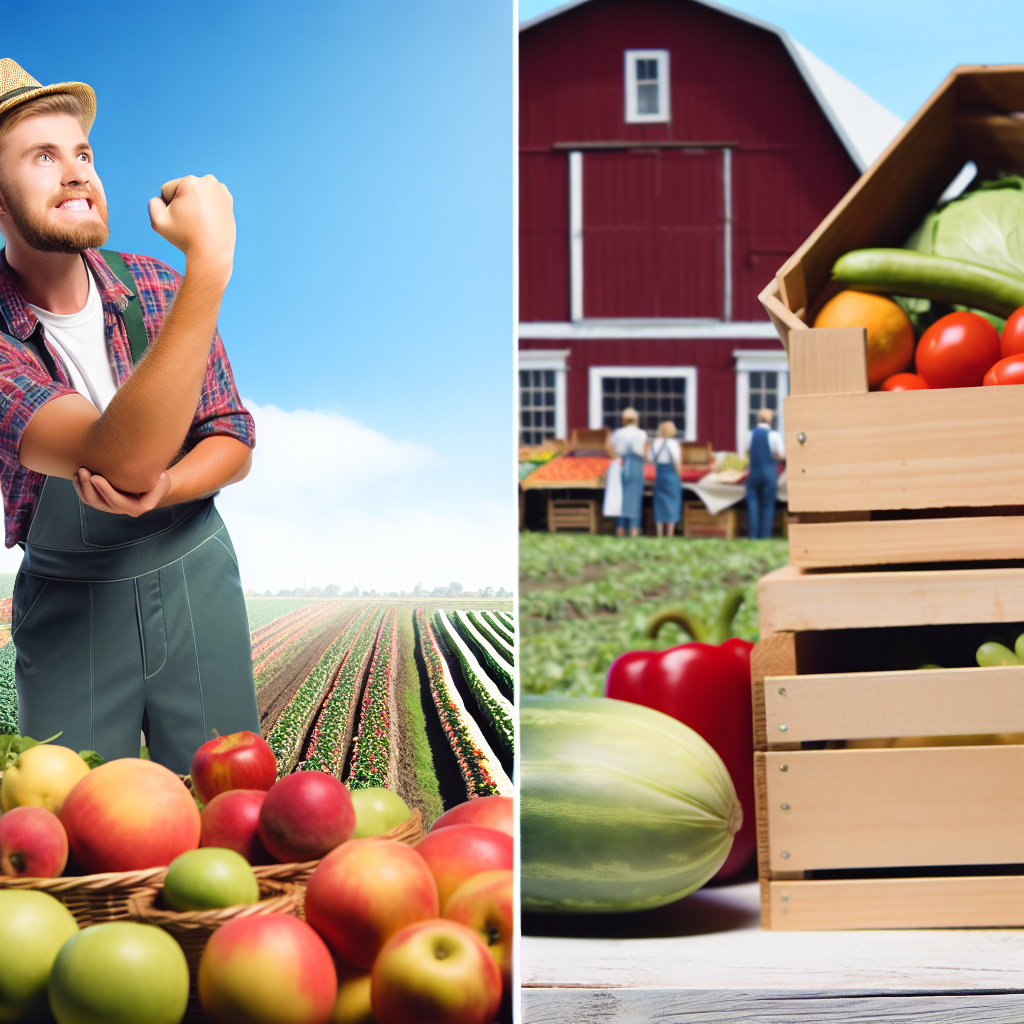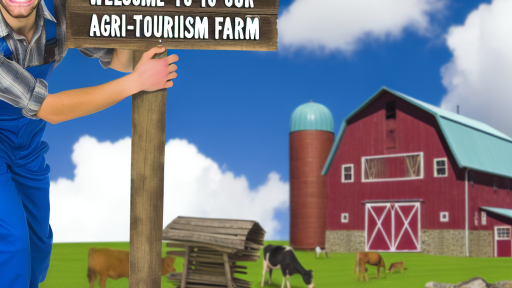Definition of Agri-Tourism and its Role in Modern Agriculture
Agri-tourism combines agriculture with tourism activities.
It allows visitors to experience farm life firsthand.
Through agri-tourism, people can learn about sustainable practices.
This approach supports local economies and farms.
Additionally, it fosters a connection between consumers and producers.
The Benefits of Agri-Tourism
Agri-tourism offers numerous benefits to farmers.
First, it provides an additional income source through visitor fees.
Second, it encourages the sale of local products directly to consumers.
This setup promotes a sustainable farm-to-table model.
Moreover, agri-tourism enhances community engagement.
Enhancing Consumer Awareness
Agri-tourism educates visitors on where their food comes from.
It helps consumers understand the effort behind food production.
This awareness builds appreciation for local agricultural practices.
Additionally, it may inspire more people to support local farmers.
Supporting Sustainable Practices
Farmers can showcase sustainable practices through agri-tourism.
Transform Your Agribusiness
Unlock your farm's potential with expert advice tailored to your needs. Get actionable steps that drive real results.
Get StartedVisitors often learn about organic farming and conservation efforts.
This exchange can lead to increased interest in these methods.
Consequently, agri-tourism promotes environmentally friendly farming.
Boosting Local Economies
Agri-tourism has a positive impact on local economies.
It creates jobs in farming, hospitality, and retail sectors.
Furthermore, it attracts visitors to rural areas.
This influx of tourists supports local businesses.
Ultimately, every visitor contributes to the community’s economic health.
Key Components of the Farm-to-Table Movement
Understanding Farm-to-Table
The farm-to-table movement emphasizes the direct connection between farmers and consumers.
This approach promotes fresh, locally sourced food options.
Consumers become more aware of where their food originates.
Additionally, it encourages sustainable agriculture practices.
Local Sourcing
Local sourcing is a cornerstone of the farm-to-table philosophy.
This practice reduces transportation costs and environmental impacts.
Furthermore, it supports local economies and farmers.
Farmers’ markets play a crucial role in connecting consumers with local produce.
Freshness and Quality
Freshness significantly impacts the taste and nutritional quality of food.
Food harvested at peak ripeness offers superior flavor.
Moreover, reduced time from farm to table enhances food safety.
Consumers are increasingly looking for high-quality, fresher options.
Consumer Education
Education is vital for promoting the farm-to-table movement.
Consumers benefit from understanding seasonal produce availability.
Workshops and farm tours help bridge the knowledge gap.
Additionally, educational outreach fosters community engagement.
Showcase Your Farming Business
Publish your professional farming services profile on our blog for a one-time fee of $200 and reach a dedicated audience of farmers and agribusiness owners.
Publish Your ProfileSustainability Practices
Sustainability is a key aspect of the farm-to-table concept.
This movement encourages reduced use of pesticides and fertilizers.
Farmers are increasingly adopting regenerative practices for soil health.
Consequently, there is a rise in organic and sustainable farms.
Benefits of Agri-Tourism for Local Farms and Producers
Economic Growth
Agri-tourism provides a significant income stream for local farms.
This additional revenue helps farmers invest in better equipment and practices.
Furthermore, it reduces reliance on traditional crop sales.
Visitors contribute to the local economy by spending on accommodations and dining.
Consequently, communities benefit from increased tourism-related jobs.
Education and Awareness
Agri-tourism offers educational opportunities about sustainable farming.
Visitors gain insights into food production and local agricultural practices.
This knowledge fosters appreciation for the farm-to-table movement.
Many visitors share their experiences, enhancing awareness among their peers.
By educating the public, farmers can build a dedicated customer base.
Strengthening Community Ties
Agri-tourism cultivates relationships among community members.
Farm events encourage collaboration between local businesses and producers.
This synergy results in shared marketing and promotional strategies.
Local farms often partner with restaurants to showcase farm-fresh ingredients.
Such partnerships enhance community pride and cooperation.
Enhancing Customer Connections
Agri-tourism allows farmers to connect directly with consumers.
Farmers can share their stories and practices firsthand.
This personal engagement fosters customer loyalty and trust.
Visitors are more likely to support local producers after visiting their farms.
Additionally, farms can gather valuable feedback to improve their offerings.
Preservation of Agricultural Land
Agri-tourism helps protect farmland from urban development.
By showcasing the beauty of agricultural landscapes, it raises awareness.
Many communities promote agri-tourism as a viable land use strategy.
Sustained tourism revenue encourages landowners to maintain their farms.
Ultimately, this leads to the conservation of local heritage and resources.
Discover More: Embracing Seasonal Produce in Farm-to-Table Systems
How Agri-Tourism Facilitates Consumer Education on Food Sources
Direct Interactions with Farmers
Agri-tourism allows consumers to meet farmers directly.
This interaction fosters trust between consumers and producers.
Visitors gain valuable insights into farming practices.
It creates a personal connection to food sources.
Therefore, education about farming becomes engaging and relatable.
Hands-On Learning Experiences
Many agri-tourism locations offer hands-on activities.
Consumers can pick fruits or vegetables straight from the field.
This experience enhances their understanding of where food comes from.
Additionally, hands-on activities promote appreciation for agricultural work.
As a result, consumers become more informed about seasonal produce.
Showcase Your Farming Business
Publish your professional farming services profile on our blog for a one-time fee of $200 and reach a dedicated audience of farmers and agribusiness owners.
Publish Your ProfileWorkshops and Educational Programs
Many farms host workshops to teach cooking or preservation techniques.
These programs educate visitors on utilizing fresh ingredients.
Farmers often share their knowledge of sustainable practices.
In turn, consumers learn how to make healthier food choices.
This education supports the farm-to-table movement effectively.
Enhanced Awareness of Local Food Systems
Agri-tourism promotes local food systems to visitors.
Consumers become more aware of their regional agriculture.
This awareness encourages support for local farmers.
Consequently, it strengthens community ties around food sources.
Furthermore, recognizing local food systems benefits the environment.
Marketing Fresh Produce
Agri-tourism provides farms a platform to market their produce.
Visitors can sample fresh products directly from the source.
This sampling experience drives consumer interest in farm-fresh items.
Moreover, farms can showcase unique products to potential customers.
By connecting directly with consumers, farms increase their reach.
Find Out More: Benefits of Local Food Sourcing for Sustainable Farms
Case Studies of Successful Agri-Tourism Initiatives
Sunny Meadows Farm
Sunny Meadows Farm in Virginia showcases the benefits of agri-tourism.
This farm offers visitors hands-on experiences, such as fruit picking.
Moreover, it hosts educational workshops on sustainable farming techniques.
Visitors learn the importance of local food systems while enjoying the outdoors.
This initiative significantly boosts the farm’s sales and community engagement.
Green Acres Vineyard
Green Acres Vineyard in California combines wine tasting with farm tours.
Guests explore the vineyard and understand the winemaking process.
The vineyard organizes seasonal events, attracting tourists year-round.
Ultimately, this approach enhances local tourism and increases the vineyard’s profitability.
Harvest Hill Orchards
Harvest Hill Orchards in Oregon specializes in agritourism experiences.
Their popular apple-picking events connect families with the farm.
Additionally, they offer cider-making classes that engage visitors fully.
This interactive approach promotes awareness of local agricultural practices.
Therefore, the orchard strengthens its community ties and sales.
Mountain View Dairy
Mountain View Dairy in Wisconsin invites visitors to explore dairy farming.
The farm provides interactive tours that educate about dairy production.
Participants can feed cows and learn about milk processing techniques.
These experiences create a strong connection between consumers and producers.
This initiative helps foster a greater appreciation for dairy products.
Riverside Farm Retreat
Riverside Farm Retreat in New York offers accommodations and farm activities.
Guests can enjoy farm-to-table meals prepared with local ingredients.
This immersive experience highlights the significance of fresh produce.
Consequently, visitors support local farmers and sustainable practices.
This unique initiative attracted tourism while promoting healthy eating habits.
Showcase Your Farming Business
Publish your professional farming services profile on our blog for a one-time fee of $200 and reach a dedicated audience of farmers and agribusiness owners.
Publish Your ProfileFind Out More: Seasonal Eating Advantages for Local Farmers

The Economic Impact of Agri-Tourism on Rural Communities
Boosting Local Economies
Agri-tourism serves as a vital economic booster for rural areas.
Visiting farms increases local spending on goods and services.
As tourists arrive, they stimulate demand for local produce.
Consequently, farmers can diversify their income streams.
This additional revenue enhances financial stability for families.
Job Creation Opportunities
Agri-tourism creates a variety of job opportunities in rural areas.
Farmers often need help with tours and on-site experiences.
This demand leads to hiring local guides and staff.
Furthermore, it encourages entrepreneurship in nearby businesses.
Local artisans and vendors also benefit from increased foot traffic.
Preserving Cultural Heritage
Agri-tourism promotes the preservation of rural cultural heritage.
Visitors engage with local traditions and farming practices.
This interaction fosters a sense of community pride.
Moreover, it offers educational experiences for tourists.
Farms often showcase local history and sustainable practices.
Encouraging Sustainable Practices
Agri-tourism incentivizes farmers to adopt sustainable methods.
Tourists increasingly seek eco-friendly and ethical practices.
This shift drives innovation in farming techniques.
As a result, farmers become more environmentally conscious.
Moreover, sustainable practices attract more visitors.
Enhancing Local Infrastructure
Increased tourism often leads to improved local infrastructure.
Communities may invest in roads, signage, and facilities.
These enhancements benefit not only tourists but residents as well.
Increased accessibility contributes to overall economic growth.
Furthermore, better infrastructure supports various local businesses.
See Related Content: Creating a Local Food Sourcing Business Model
Strategies for Farmers to Integrate Agri-Tourism into Their Operations
Understanding the Basics of Agri-Tourism
Agri-tourism allows visitors to engage with farming activities.
This approach promotes education about sustainable practices.
Additionally, it supports local economies by drawing tourists.
Utilizing Farm Experiences
Farmers can create hands-on experiences for guests.
These can include berry picking, hayrides, or guided tours.
Such activities encourage visitors to learn about farming directly.
Offering Educational Workshops
Farmers can host workshops on various topics related to agriculture.
Examples include cooking classes, gardening tips, or sustainability practices.
These workshops engage visitors while providing valuable skills.
Creating Unique Accommodations
Farmers might consider offering lodging on their property.
Options can include rustic cabins or tent camping experiences.
Unique accommodations attract visitors seeking an immersive experience.
Partnering with Local Businesses
Collaboration with local restaurants can enhance offerings.
Showcase Your Farming Business
Publish your professional farming services profile on our blog for a one-time fee of $200 and reach a dedicated audience of farmers and agribusiness owners.
Publish Your ProfileFarmers can provide fresh produce for meals prepared on-site.
This strengthens the farm-to-table concept while promoting local cuisine.
Leveraging Social Media and Online Marketing
Farmers should utilize social media to promote their agri-tourism ventures.
They can share engaging content, such as visitor testimonials and photos.
This helps build an online presence and attract more visitors.
Implementing Sustainable Practices
Employing sustainable farming practices can enhance agri-tourism appeal.
Visitors appreciate farms mindful of their environmental impact.
Highlighting these practices can attract an eco-conscious audience.
Gathering Feedback for Improvement
Farmers should seek visitor feedback to refine their offerings.
This can lead to insight on areas of improvement and new ideas.
Continuous adaptation helps meet the evolving needs of guests.
Challenges and Considerations in Developing Agri-Tourism Opportunities
Understanding the Legal Framework
One of the main challenges is navigating local regulations.
Farmers must comply with zoning and health codes.
Understanding liability laws is also crucial.
Adhering to safety standards helps protect guests.
Engaging with legal experts can clarify requirements.
Identifying Target Audience
Finding the right audience is essential for success.
Farmers should consider who is most likely to visit.
Families with children often seek educational experiences.
Food enthusiasts may want hands-on culinary activities.
Marketing strategies need to cater to these groups.
Financial Investments and Returns
Developing agri-tourism requires upfront investments.
Costs can include marketing, infrastructure, and staffing.
Evaluating potential returns is critical before starting.
Farmers need a clear financial plan and budget.
Long-term success often depends on initial financial planning.
Creating Unique Experiences
Providing memorable experiences distinguishes successful farms.
Farm tours, workshops, and farm-to-table dinners can attract visitors.
Innovative activities can enhance the overall experience.
Farmers must ensure their offerings reflect their products.
Additionally, listening to visitor feedback is beneficial.
Managing Seasonal Fluctuations
Seasonality can significantly impact visitor numbers.
Identifying peak seasons is essential for planning.
Farmers should develop year-round activities to draw guests.
Creating partnerships with local businesses can help.
This approach ensures a consistent flow of visitors.
Building Community Relationships
Establishing good relations with the local community is vital.
Farmers should collaborate with nearby organizations.
Community support can enhance the credibility of initiatives.
Participation in local events increases visibility.
Showcase Your Farming Business
Publish your professional farming services profile on our blog for a one-time fee of $200 and reach a dedicated audience of farmers and agribusiness owners.
Publish Your ProfileSharing resources with neighbors fosters a cooperative spirit.
Additional Resources
Farm-to-table movement – (International Food and Culture) – Vocab …
Local Food Systems: Concepts, Impacts, and Issues, ERR 97, US …




